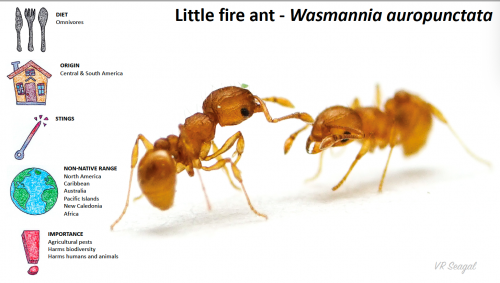Everyone can do science. It is about making observations and asking questions. Outdoor observations lead to new questions. Take some time to observe the nature around you. That is the first step of being a biodiversity scientist.
At the University of Florida, the Lucky lab studies ant diversity.
Why study ants? Ants are responsible for important ecosystem services like biodegradation, or the breakdown of organic matter, soil turnover and the cycling of nutrients throughout soil. Many ant species also participate in spreading seeds. These services are crucial to a functioning, healthy ecosystem. However, some introduced, non-native species bite or sting, and interfere with these normal ecosystem services.
The Lucky lab is currently conducting multiple experiments with an invasive ant called the little fire ant, Wasmannia auropunctata. Studying this species’ biology helps better our understanding of them so we can prevent continuous spread. This motivates us to spread awareness about this species to our communities.
In February and March, four UF ant scientists from the Lucky Lab visited classrooms in Alachua and Palm Beach County to teach about the importance of ants and engage students in authentic scientific research. This outreach was performed as part of the Thompson Earth Science Institute’s Scientist in Every Florida School initiative, which aims to pair every school in Florida with an Earth systems scientist.
Students received training on sampling for ants and were given kits to perform sampling in their neighborhoods.
“The little fire ant is a tiny, slow-moving orange ant that can absolutely blanket an area. We want to know more about where these are located and where they might be moving in Florida. Students can help. Ants collected by students could help us record new locations for this ant,” said Jacob Hornfeldt, an undergraduate researcher at the University of Florida’s Department of Entomology and Nematology.

Have you seen this ant? If so, the Lucky lab wants to know! Please contact Virginia-Rose Seagal at seagal.vr@gmail.com.
After participating in data collection, ant scientists will follow up with Skype visits to discuss and analyze the collection results. These activities relate to CPALMs standards regarding the process and practice of science.
“Kids tend to be really interested and excited about science, and they were especially excited about observing the ants outside and under the microscope,” said Virginia-Rose Seagal, master’s student in the Lucky Lab at the University of Florida’s Department of Entomology and Nematology.
“It is important to expose kids to science early. It provides an opportunity to foster curiosity instead of fear.”